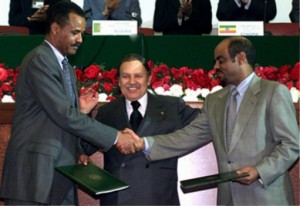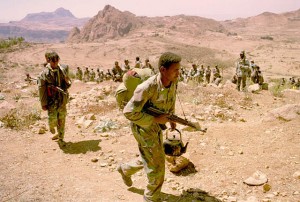
“On 12 December 2000, the governments of Ethiopia and Eritrea signed a peace treaty in Algiers. To the Ethiopian Human Rights Council (EHRCO), the mere fact that both governments have signed the peace treaty is a good start. EHRCO would like to express its hope that future negotiations between the two governments result in a lasting and certain peace.
The protracted war that has been going in the region has killed, disabled, and displaced thousands of citizens, has destroyed lots of private and public property and hindered development efforts. It is an irrefutable fact that the destruction caused by the recent and relatively short war was appalling. That is why that the December 12 peace agreement between the two countries becomes a hopeful sign for the respect and protection of the human and civil rights of citizens.”
Read more here

